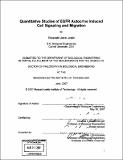Quantitative studies of EGFR autocrine induced cell signaling and migration
Author(s)
Joslin, Elizabeth Jane
DownloadFull printable version (13.50Mb)
Alternative title
Quantitative studies of epidermal growth factor receptor autocrine induced cell signaling and migration
Other Contributors
Massachusetts Institute of Technology. Biological Engineering Division.
Advisor
Douglas A. Lauffenburger.
Terms of use
Metadata
Show full item recordAbstract
Epidermal growth factor (EGF) receptor autocrine and/or paracrine signaling plays an important role in normal epithelial cell proliferation, survival, adhesion and migration. Aberrant expression of the EGF receptor and its cognate ligands have been implicated in various types of cancers, hence EGF receptor autocrine activation is thought to also be involved in tumorigenesis. EGF family ligands are synthesized as membrane-anchored proteins requiring proteolytic release to form the mature soluble, receptor-binding factor. Despite the pathophysiological importance of autocrine systems, how protease-mediated ligand release quantitatively influences receptor-mediated signaling and consequent cell behavior is poorly understood. Therefore, we explored the relationship between autocrine EGF release rate and receptor-mediated ERK activation and migration in human mammary epithelial cells. A quantitative spectrum of EGF release rates was achieved using chimeric EGF ligand precursors modulated by the addition of the metalloprotease inhibitor batimastat. We found that ERK activation increased with increasing ligand release rates despite concomitant EGF receptor downregulation. (cont.) Cell migration speed depended linearly on the steady-state phospho-ERK level, but was much greater for autocrine compared to exogenous stimulation. In contrast, cell proliferation rates were constant across the various treatment conditions. In addition, we investigated an EGFR-mediated positive feedback through ERK that stimulated a 4-fold increase in release rate of our TGFa based construct. Thus, in these cells, ERK-mediated migration stimulated by EGF receptor signaling is most sensitively regulated by autocrine ligand control mechanisms.
Description
Thesis (Ph. D.)--Massachusetts Institute of Technology, Biological Engineering Division, 2007. Includes bibliographical references.
Date issued
2007Department
Massachusetts Institute of Technology. Department of Biological EngineeringPublisher
Massachusetts Institute of Technology
Keywords
Biological Engineering Division.